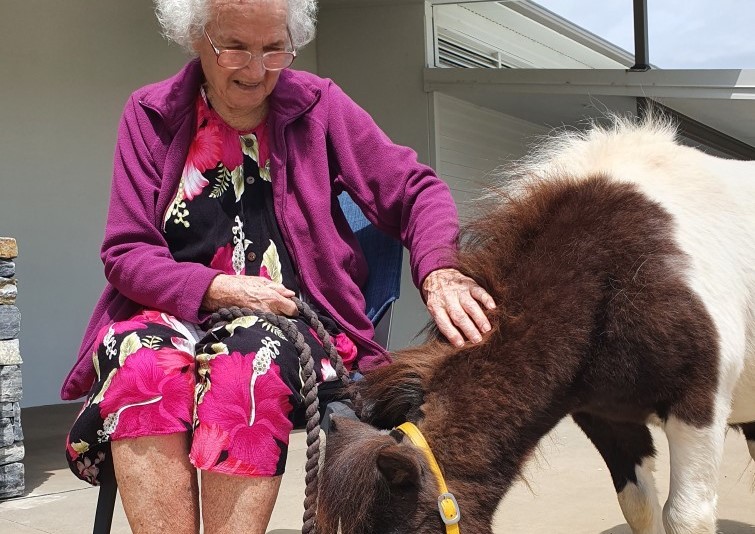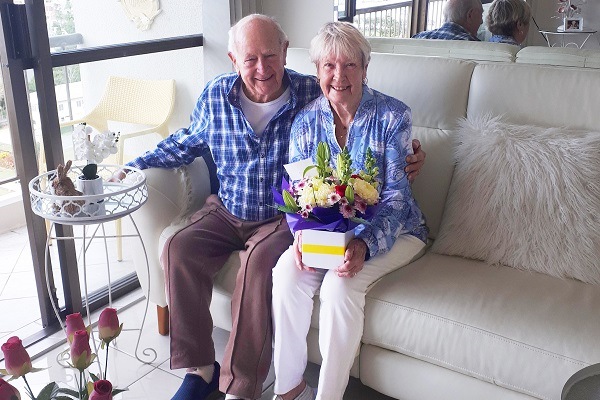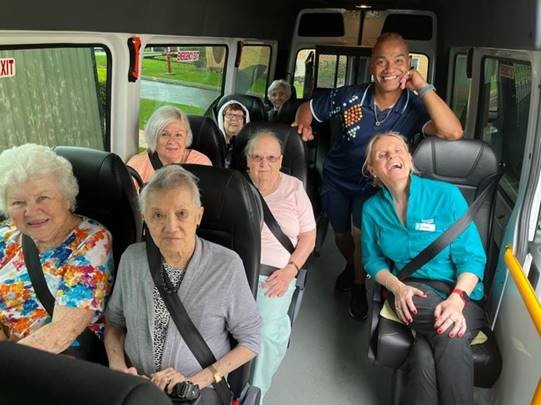Connecting with animals: It makes paw-fect sense

Warwick is a town well-known for its many horse shows and competitions, including the annual Warwick Rodeo, ‘Australia’s Most Famous’ rodeo. Many Warwick Aged Care residents have past experiences with horses, which inspired Seniors Chaplain Donna Craig to look for an equine activity they could participate in and enjoy.
Donna always keeps the affirmation ‘I choose joy’, front of mind in both her work and personal life, so it seemed like fate when she found the Warwick-based horsemanship program Mane Matters, which operates with the purpose of ‘spreading the joy’.
Mane Matters was founded by local school chaplain Erin Wilson, with the mission to restore, renew and reconnect lives through human and horse connection. The community funded the first four equine activity sessions, and Erin then donated her time and continued running the program each fortnight free of charge.The residents spend their time giving Dreamy lots of pats and cuddles and helping with his grooming.
Studies have shown that interactions with horses can offer therapeutic benefits for seniors, including improved wellbeing, quality of life, trust, and a sense of purpose and accomplishment. Donna said that the team at Warwick have seen firsthand the benefits of the equine activity program.
“The program has become very popular. We usually have about 40 residents taking part each time and it’s something that everyone looks forward to. We have seen the interactions with Dreamy impact our residents in many ways – from fostering meaningful connections, to relighting the spark of communication, and providing a sense of purpose,” Donna said.
Isabelle is one of the many residents who looks forward to the equine activity program. She misses her old pet dog dearly, so the interactions with Dreamy have become very special to her. The two have formed a close bond and Isabelle regularly talks about how much she loves Dreamy.
Daryl found his voice again through his interactions with Dreamy. Usually a man of few words, he doesn’t communicate with many people, but loves talking to Dreamy when they spend time together.
Kevin is one of Warwick’s most energetic residents and often tries to venture off into town on his own. On one occasion, he was becoming frustrated that he couldn’t leave campus when one of the carers asked for his help to groom Dreamy. He became completely absorbed in the task, and when he was finished he said ‘I just did a good day’s work’! Kevin was proud of his accomplishment and stayed relaxed and happy for the rest of that day.
“We look forward to continuing our equine activity program at Warwick Aged Care Service, and exploring more opportunities for future animal interactions at our services,” Donna said.
Going pet-friendly in Aged Care Services
Ashok Sharma, Churches of Christ Clinical Support and Governance Manager, is a passionate advocate for animal interactions in aged care services.
“In my previous experience, I have seen some wonderful outcomes for residents, with positive impacts on people’s sense of isolation and loneliness and their emotional wellbeing. There are also well-documented physical health benefits.
“It is important to manage the interaction safely, with the proper risk assessments, infection control strategies and logistics policies in place. But once you have addressed those important considerations, I am completely supportive of aged care residents having the opportunity to spend time with animals,” he said.
“Earlier in my career I helped transform an aged care service I was working at to a pet-friendly one, and the feedback was overwhelmingly positive. We were able to take in residents that other services had turned away because the resident didn’t want to leave their pet behind – but we said yes.
“I recall one resident who had a pug dog named Bruce, who was 14 years old and blind. The resident thought she would have to have him put down if she made the move into residential care, so she stayed away at the detriment of her own health and safety. She was so concerned for Bruce and the situation was causing her lots of stress. But, she wouldn’t accept any help.
“So, we took the necessary steps to make our service pet-friendly, and we were able to welcome both the resident and Bruce. Bruce became quite the celebrity at the service, with other residents loving having him around and always giving him lots of attention and cuddles. It was fantastic to see Bruce lift everyone’s spirits, and serve as an important reminder of the benefits of animal interactions.
“Julie was another resident who came into our pet-friendly service as a respite patient. She did not have any family or friends, and had a public trustee looking after her finances. After her four weeks of respite care, the public trustee contacted our service and asked for her to receive permanent care as she couldn’t stay in her home safely.
“The first time I met Julie was with the Public Trustee. We went to her room and talked with her and she said she was feeling happy and pleased with the services we were providing. We asked her if she’d like to live permanently at the service and she said that was okay. But, I knew something wasn’t right.
“Julie had been to hospital four times in the previous month, and she wasn’t eating or drinking. When I asked her about this, she said it was because she was missing her two cats and that she was very sad not to have them with her. She said that she knew she was depressed but she had been prescribed antidepressants so thought she would improve soon.
“So, we got to work tracking down Julie’s cats. With some luck, we found them and arranged for them to come and live with her. Within two weeks of her cats returning, Julie no longer required her antidepressants. She immediately resumed eating and drinking and there were no more weekly hospital visits. She happily lived at the service with her cats for more than two years, showcasing the huge impact the cats had on her emotional wellbeing, physical health and quality of life.”
Whether it’s a pony, a pug, or two cats - connecting with animals is beneficial for the physical and mental health of aged care residents.



